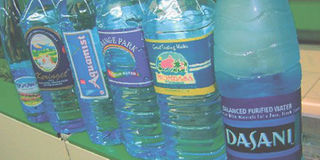Ministry crafts way to ascertain fit bottled water

On May 11, 2016, the Kenya Bureau of Standards released a list of 368 water bottling firms that have violated health standards. FILE PHOTO
What you need to know:
- The companies—most based in Nairobi— lacked valid permits from the agency, failed to comply with the code of hygiene, used suspect water sources, had poor and misleading labelling.
- Dr Muraguri said depending on the contaminant, the consumer might be at risk of Hepatitis A, cholera, typhoid among other water borne infections which may be fatal.
Kenyans can now verify whether the water they buy is from a registered company or not by sending an SMS to 20023 with its brand name.
This came as the Health ministry warned of a “mushrooming problem of water-borne infections”.
Kenya Bureau of Standards Managing Director Charles Ongwae said a response would be received in “three seconds and cost Sh1”.
On Wednesday, the bureau released a list of 368 water-bottling firms that have violated the standards.
The companies — most based in Nairobi — lacked valid permits from the agency, failed to comply with the code of hygiene, used suspect water sources and had poor and misleading labelling.
“Send the text starting with SM#name of product and you will get feedback on whether it is a company within our database or whether the drink is from an unregistered entity,” he said.
The platform can also be used to verify the authenticity of other purchased products.
He said there has been an upsurge in dodgy water-bottling firms and companies will now be required to indicate the source of their product on their labels.
This would be verified by the bureau to confirm the water’s safety.
Mr Ongwae, however, said the agency was ready to work with the affected water firms to “achieve the required standards as a condition to recertification”.
Already, there are 600 registered water bottling firms in the country.
There have also been concerns about reused bottles. “Once done with the bottle, you need to crumple it up such that it is no longer usable. When you twist a plastic bottle it releases a smell that doesn’t go away even if you reuse it,” he said.
Health Principal Secretary Nicholas Muraguri has asked Kenyans to be cautious following the suspension of the water licences.
Dr Muraguri said depending on the contaminant, the consumer might be at risk of Hepatitis A, cholera and typhoid, among other waterborne infections that may be fatal.
“It is sad that Kenyans buy water which they think is safe but they end up with contamination,” he said.
Editor's note: Click here to download the list of suspended companies.





